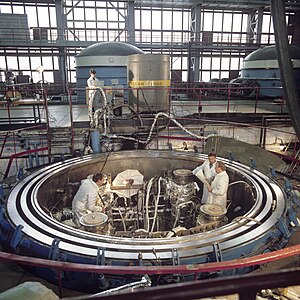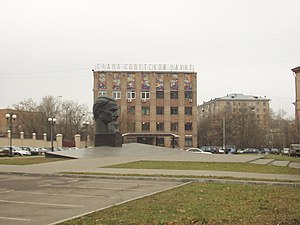 Image via Wikipedia
Image via Wikipedia Image via Wikipedia
Image via Wikipedia Image via Wikipedia
Image via Wikipediahttp://sites.nationalacademies.org/PGA/cisac/PGA_060004
News
CRDF Global periodically releases news items of general or topical interest. If you are a member of the media and wish to receive news alerts, please sign up for our mailing list. Please direct all media inquiries to EA Dyson, 703-526-2339, or email the CRDF Global Media Relations office.
Symposium Panel Examines Role of Scientists in Science Diplomacy
Mar 16, 2011
CRDF Global President and CEO Cathy Campbell moderated a panel on the role of scientists in enhancing communication and confidence between and among countries at a Jan. 19, 2011 symposium on science diplomacy in support of international security. The symposium -- entitled "From Reykjavik to New START: Science Diplomacy for Nuclear Security in the 21st Century" - was organized by the National Academy of Sciences Committee on International Security and Arms Control (CISAC) and the United States Institute of Peace (USIP). CRDF Global's Robin Copeland also attended, as well as prominent scientists from Russia and the United States.
During the panel moderated by Campbell, Richard Garwin of the IBM Thomas J. Watson Research Center and Evgeniy N. Avrorin of the All-Russian Institute of Technical Physics (ret.) discussed the role of U.S.-Soviet/Russian NGO dialogues and possible directions for the future. Nikolai N. Ponomarev-Stepnoi, Kurchatov Institute and John F. Ahearne, Sigma Xi1 also discussed the disposition of excess weapons fissile material.
The Honorable William Perry, the Honorable Rose Gottemoeller, Academician Evgeny N. Avrorin, Dr. Richard Garwin, and several other distinguished speakers addressed several important topics:
During the panel moderated by Campbell, Richard Garwin of the IBM Thomas J. Watson Research Center and Evgeniy N. Avrorin of the All-Russian Institute of Technical Physics (ret.) discussed the role of U.S.-Soviet/Russian NGO dialogues and possible directions for the future. Nikolai N. Ponomarev-Stepnoi, Kurchatov Institute and John F. Ahearne, Sigma Xi1 also discussed the disposition of excess weapons fissile material.
The Honorable William Perry, the Honorable Rose Gottemoeller, Academician Evgeny N. Avrorin, Dr. Richard Garwin, and several other distinguished speakers addressed several important topics:
- Examples from past U.S.-Soviet/Russia interactions and how the lessons learned can be applied to current and future challenges.
- Monitoring and verification needs in the future.
- Scientists' role in enhancing security communication and confidence between and among countries.

